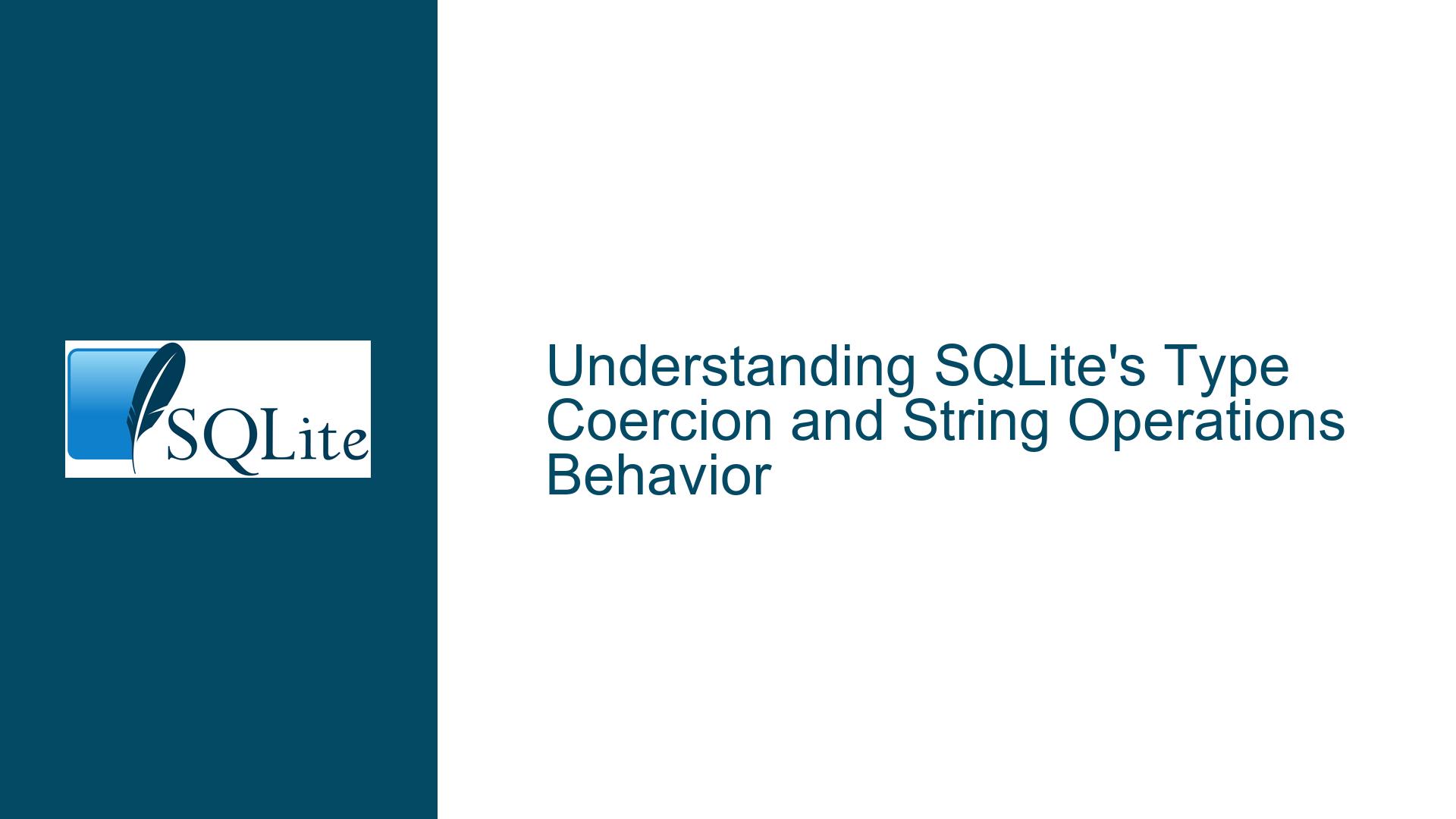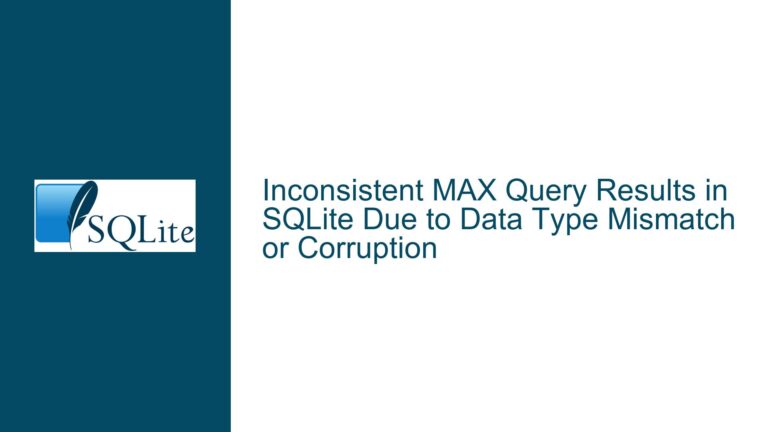SQLite’s Type Coercion and String Operations Behavior
SQLite’s Dynamic Type System and Arithmetic Operations
SQLite’s handling of string arithmetic and type coercion exhibits unique behaviors that can surprise developers familiar with other database systems. The core issue revolves around SQLite’s dynamic type system and its automatic type conversion rules when performing arithmetic operations on strings and NULL values.
When SQLite encounters arithmetic operations (+, -, *, /) with string operands, SQLite attempts to convert these strings to numeric values through an implicit CAST operation. If the string cannot be successfully converted to a number, SQLite coerces the string to 0, which explains why ‘abc’+’def’ results in 0. This behavior is part of SQLite’s type affinity system, where the database engine attempts to convert values between different storage classes based on the operation context.
The NULL handling in arithmetic operations follows SQL standard behavior, where any arithmetic operation involving NULL produces NULL as the result. This principle applies consistently across all arithmetic operations in SQLite, making NULL propagation predictable but potentially unexpected for developers new to SQL databases.
String concatenation in SQLite requires the use of the || operator rather than the + operator, which is a common source of confusion for developers coming from programming languages where + performs string concatenation. The + operator in SQLite is strictly reserved for arithmetic operations, and when used with strings, triggers the numeric conversion behavior described above.
SQLite’s type system is particularly relevant in web and mobile applications where SQLite serves as an embedded database. The lightweight nature of SQLite makes it ideal for these use cases, but developers must understand these type conversion rules to avoid unexpected results in their queries. The database engine’s behavior is well-documented and follows consistent rules, but these rules differ significantly from other programming environments where type coercion might be more strict or follow different patterns.
The issue becomes especially important when dealing with data validation and ensuring type safety in applications. While SQLite’s flexible type system can be convenient, it can also mask potential data quality issues if not properly understood and handled. Developers should consider using SQLite’s STRICT tables and NOT NULL constraints to enforce stronger type checking when needed, particularly when working with mixed data types or when data consistency is crucial.
Root Causes of SQLite Type Coercion Behaviors
SQLite’s type coercion behaviors stem from several fundamental design decisions and implementation characteristics within the database engine. The primary mechanism driving unexpected arithmetic results involves SQLite’s storage class system, which maintains five distinct storage classes: NULL, INTEGER, REAL, TEXT, and BLOB. When performing arithmetic operations, SQLite employs a sophisticated type affinity algorithm that attempts to convert operands into compatible numeric types.
The conversion of strings to numbers follows a specific pattern where SQLite first attempts to parse the string as an integer or floating-point number. During this conversion process, SQLite reads the string from left to right until encountering a non-numeric character. If the initial portion of the string contains valid numeric characters, SQLite uses that value; otherwise, the string converts to 0. This explains why arithmetic operations on purely alphabetic strings consistently yield zero.
The NULL propagation behavior originates from SQL’s three-valued logic system, where NULL represents an unknown value. SQLite strictly adheres to this principle, ensuring that any arithmetic operation involving NULL produces NULL as the result. This implementation choice maintains consistency with SQL standards while potentially creating unexpected results for developers accustomed to other programming languages’ NULL handling.
String comparison behaviors introduce additional complexity because SQLite employs collation sequences rather than numeric conversion when comparing text values. The default collation sequence, BINARY, compares strings byte by byte, which explains why string comparisons like ‘a’ < ‘b’ produce expected results even though both strings would convert to 0 in arithmetic contexts.
| Operation Type | Conversion Mechanism | Result Behavior |
|---|---|---|
| String Arithmetic | Numeric parsing from left to right | Returns 0 for non-numeric strings |
| NULL Arithmetic | Three-valued logic | Propagates NULL |
| String Comparison | Collation sequence | Uses byte-by-byte comparison |
| Mixed-type Arithmetic | Type affinity rules | Converts to numerics when possible |
The absence of automatic string concatenation using the + operator reflects SQLite’s strict adherence to SQL standards, where || serves as the dedicated string concatenation operator. This design choice prevents ambiguity between string concatenation and arithmetic addition, though it may surprise developers familiar with programming languages that overload the + operator for both purposes.
The type coercion system’s flexibility, while powerful, can mask data quality issues by silently converting invalid data rather than raising errors. This behavior becomes particularly relevant in applications requiring strict type safety or dealing with user-supplied data where implicit conversions could hide input validation problems. The introduction of STRICT tables in recent SQLite versions provides a mechanism to enforce stronger type checking, though this feature must be explicitly enabled.
Understanding these underlying causes helps developers anticipate and properly handle type conversion scenarios, leading to more robust and predictable database operations. The behavior of SQLite’s type system, while sometimes counterintuitive, follows consistent and well-documented rules that serve specific purposes in the database engine’s design.
Implementing Robust Type Handling in SQLite Applications
SQLite applications can achieve reliable type handling and arithmetic operations through several comprehensive approaches and best practices. The implementation of proper type management begins with schema design, where developers should leverage SQLite’s STRICT tables and explicit type constraints to prevent unexpected type coercion behaviors.
Creating tables with the STRICT keyword enforces type checking during data insertion and modification. This approach requires explicit type conversions and prevents silent type coercion:
CREATE TABLE transactions (
amount DECIMAL NOT NULL,
description TEXT NOT NULL,
timestamp INTEGER NOT NULL
) STRICT;
For string operations, developers should consistently use the appropriate operators and functions. String concatenation should always employ the || operator rather than arithmetic operators:
-- Correct string concatenation
SELECT first_name || ' ' || last_name AS full_name FROM users;
-- Explicit type conversion for arithmetic
SELECT CAST(numeric_string AS DECIMAL) * multiplier FROM calculations;
When dealing with potentially NULL values, applications should implement explicit NULL handling using COALESCE or IFNULL functions to provide default values:
SELECT COALESCE(nullable_column, 0) + other_column AS safe_addition
FROM number_table;
| Operation Type | Safe Implementation | Purpose |
|---|---|---|
| String Concatenation | column1 || column2 | Combines text values |
| Numeric Conversion | CAST(text_column AS DECIMAL) | Explicit type conversion |
| NULL Handling | COALESCE(nullable_column, default_value) | Prevents NULL propagation |
| Type Validation | CHECK constraints | Ensures data integrity |
For applications requiring strict type safety, implementing CHECK constraints provides additional validation:
CREATE TABLE measurements (
value TEXT NOT NULL,
unit TEXT NOT NULL,
CHECK (value GLOB '[0-9]*[.][0-9]*' OR value GLOB '[0-9]*'),
CHECK (unit IN ('kg', 'm', 's'))
);
Database interactions should include proper error handling to catch type-related issues:
BEGIN TRANSACTION;
INSERT INTO strict_table(numeric_column)
SELECT CASE
WHEN CAST(input_value AS DECIMAL) IS NOT NULL
THEN CAST(input_value AS DECIMAL)
ELSE RAISE(FAIL, 'Invalid numeric input')
END
FROM input_data;
COMMIT;
Applications should implement validation layers that verify data types before insertion:
CREATE TRIGGER validate_numeric_input
BEFORE INSERT ON calculations
FOR EACH ROW
BEGIN
SELECT CASE
WHEN NEW.value NOT REGEXP '^[0-9]+(\.[0-9]+)?$'
THEN RAISE(ABORT, 'Invalid numeric format')
END;
END;
For string comparison operations, explicitly specify collation sequences to ensure consistent behavior:
CREATE TABLE sorted_text (
text_column TEXT COLLATE NOCASE
);
SELECT * FROM sorted_text
ORDER BY text_column COLLATE BINARY;
When working with date and time values, use appropriate storage formats and conversion functions:
CREATE TABLE events (
event_timestamp INTEGER DEFAULT (strftime('%s', 'now')),
CHECK (event_timestamp > 0)
);
Performance optimization for type-safe operations can be achieved through proper indexing and constraints:
CREATE TABLE performance_critical (
id INTEGER PRIMARY KEY,
numeric_value DECIMAL NOT NULL,
text_value TEXT NOT NULL,
CHECK (numeric_value >= 0)
);
CREATE INDEX idx_numeric_value ON performance_critical(numeric_value)
WHERE numeric_value IS NOT NULL;
Regular database maintenance should include validation queries to identify potential type inconsistencies:
SELECT column_name,
COUNT(*) as total_rows,
SUM(CASE WHEN CAST(column_name AS DECIMAL) IS NULL
AND column_name IS NOT NULL
THEN 1 ELSE 0 END) as invalid_numbers
FROM target_table
GROUP BY column_name
HAVING invalid_numbers > 0;
These implementations provide a robust foundation for type-safe database operations while maintaining performance and data integrity. The combination of STRICT tables, explicit type conversions, proper NULL handling, and comprehensive validation ensures reliable application behavior when dealing with SQLite’s type system.






